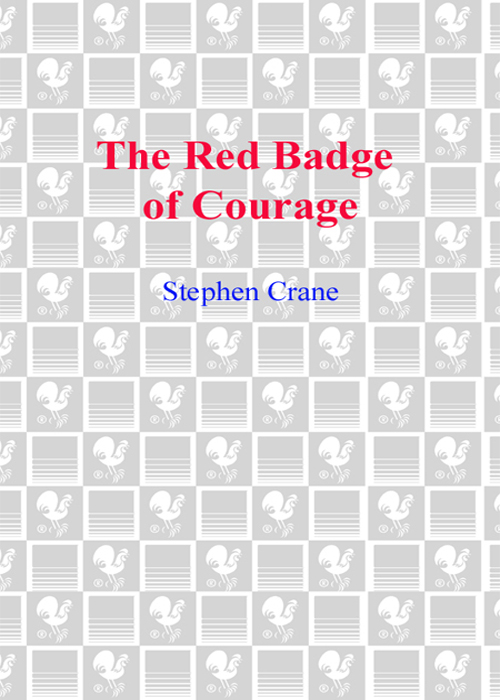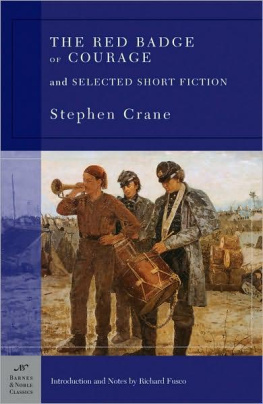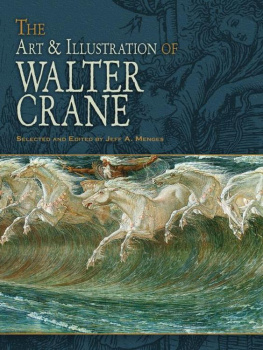Stephen Crane - The Red Badge of Courage (Bantam Classics)
Here you can read online Stephen Crane - The Red Badge of Courage (Bantam Classics) full text of the book (entire story) in english for free. Download pdf and epub, get meaning, cover and reviews about this ebook. year: 2000, publisher: Bantam Classics, genre: History. Description of the work, (preface) as well as reviews are available. Best literature library LitArk.com created for fans of good reading and offers a wide selection of genres:
Romance novel
Science fiction
Adventure
Detective
Science
History
Home and family
Prose
Art
Politics
Computer
Non-fiction
Religion
Business
Children
Humor
Choose a favorite category and find really read worthwhile books. Enjoy immersion in the world of imagination, feel the emotions of the characters or learn something new for yourself, make an fascinating discovery.

- Book:The Red Badge of Courage (Bantam Classics)
- Author:
- Publisher:Bantam Classics
- Genre:
- Year:2000
- Rating:3 / 5
- Favourites:Add to favourites
- Your mark:
- 60
- 1
- 2
- 3
- 4
- 5
The Red Badge of Courage (Bantam Classics): summary, description and annotation
We offer to read an annotation, description, summary or preface (depends on what the author of the book "The Red Badge of Courage (Bantam Classics)" wrote himself). If you haven't found the necessary information about the book — write in the comments, we will try to find it.
The Red Badge of Courage (Bantam Classics) — read online for free the complete book (whole text) full work
Below is the text of the book, divided by pages. System saving the place of the last page read, allows you to conveniently read the book "The Red Badge of Courage (Bantam Classics)" online for free, without having to search again every time where you left off. Put a bookmark, and you can go to the page where you finished reading at any time.
Font size:
Interval:
Bookmark:

THE
RED BADGE
OF COURAGE
STEPHEN CRANE
With an Introduction by Alfred Kazin
BANTAM CLASSIC
CONTENTS
INTRODUCTION
by Alfred Kazin
THE REDBadge of Courage, published in 1895, has long been considered the first great modern novel of war by an Americanthe first novel of literary distinction to present war without heroics and this in a spirit of total irony and skepticism. Since the First World War, which disenchanted a whole generation and launched a literature about war savagely critical of conventional patriotism, it has become almost a matter of custom for writers who served in war to describe their experience with bitterness. And each war since 19141918 has intensified the personal bitterness.
What makes The Red Badge of Courage so remarkable, and a pioneer in the literature of war, is that it was written entirely from instinct by a young newspaperman in his early twenties who had never seen a war. Stephen Crane was to see a good deal of war after he wrote his famous book. As a correspondent for famous newspaper syndicates of the time, he was to accompany a filibustering expedition by Cubans seeking the liberation of their island from Spain; he was in Cuba reporting the Spanish-American War and in Greece for the Graeco-Turkish war. It was typical of him to say, after he had seen hard fighting in Greece, The Red Badge is all right. And since he had been charged with imitating Tolstoy in War and Peace when he wrote The Red Badge, he amusedly looked into War and Peace for the first time and typically never finished it. It goes on and on like Texas, he complained.
Great stories about war usually have not only been written by veterans of war but have depended on the blood and thunder of war, the irresistible reality of violence, to produce certain effects. Crane, in this as in so many other things, was an iconoclast; The Red Badge of Courage deals less in external violence than in mental states. It is, indeed, a psychological novel as much as it is a novel of war. To understand how a relative boy who had never seen war could have come to such insight and detachment, it is necessary to know something of Stephen Crane. For the book, though a masterpiece of impersonality, is rooted in the personality of Crane himself. And though geniusWilliam Dean Howells, Joseph Conrad, H. G. Wells, and many lesser authors instantly recognized him as a geniusis notoriously a mystery to genius itself, Crane's life and spirit are so extraordinary that they may furnish a link to the origins of The Red Badge.
Crane was born in Newark, New Jersey, in 1871, the fourteenth child of a prominent Methodist preacher and a founder of the Women's Christian Temperance Union. An ancestor had signed the Declaration of Independence. Crane liked to boast that during the American Revolution the Cranes were pretty hot people. The children of ministers have a reputation for rebelliousness, and Crane in his stoical and tight-lipped way was no exception. He was a naturally sardonic observer of his kind even when he was a boy reporter covering New Jersey summer resorts. It was characteristic of him not to take formal education seriously; though he never finished college, he carefully stored away for literary use the impressions of human conflict that he had received on the college football field.
Crane was not yet twenty-nine when he died in Germany, 1900, after having vainly sought in the Black Forest some respite from lung disease. One of the main sources of The Red Badge may well have been Crane's early sense of death. He was to expose himself recklessly in the expeditions and wars he reported, and his famous story, The Open Boat, harrowingly turns into great literature an actual experience of shipwreck and suffering that was only one of many terrible physical inflictions that shortened his life. Crane's biographer John Berryman was sure that one impulse behind all Crane's writing was fear. If so, he certainly hid it in a defiant fashion.
Crane in his short life quickly showed himself the most original, most ruthlessly independent, most sardonic novelist of his talented generation. Crane, Theodore Dreiser, and Frank Norris were born within a few months of each other. It is startling to realize that Crane would not yet have been fifty when the 1920s, in the aftermath of World War I, saw the triumph of modernism in American writing. The Red Badge of Courage was then recognized as a model for twentieth-century novelists obsessed with the psychology of war.
In Crane's short, always tense lifetimeit somehow made an exhilarating career despite the tragedy of his personal lifehe managed many different subjects with surprising ease. Of course he did not manage himself as well as he should have. But another clue to The Red Badge is Crane's personal recklessness, his insistence on playing a tough, indifferent role. Before he died so frighteningly young that many of his friends and admirers felt that he had thrown his life away, he actually defied the New York Police Department by testifying for a prostitute arrested by corrupt policemen. Later, he defied Victorian morality by living with a woman who had operated a high-class brothel in Florida. As Mrs. Stephen Crane, which she wasn't, she accompanied him to England and to the Graeco-Turkish war. This took not only courage on both their parts but represented a deliberate refusal of the conventions. And it helps to explain the total unconventionality for its time of The Red Badge of Courage, for Crane always made a point of being different.
Crane somehow brought to focus in his person, in his work, the sudden skepticism of a generation that had seen religion's authority weakened by science and conventional patriotism abandoned for American imperialism and sabre-rattling in the 1890s. By the end of the century, when Crane died, America was to seem as aggressive in foreign policy as its European counterparts. Mark Twain in his embittered old age called this aggressiveness the great game. And if God was dead, as they first began to hint in the nineteenth century, His absence was marked by writers principally in the 1890s, the clever decade in which Crane did all his principal work. Nowhere in American writing was a godless world expressed with so much terseness and finality as in the work of Stephen Crane. He was to write in one of his astonishingly chill, totally skeptical poems that God is cold, and he repeated this in stanza after stanza as if to assure the reader that he meant it.
Like so many of the best American writers, Crane learned as a reporter to write quickly, plainly, but also to harden his style. The last thing he ever wanted was to wear his heart on his sleeve; The Red Badge, which Hemingway proclaimed to be an American classic, had an obvious influence on Hemingway's own tight-lipped style. The important thing about Crane's journalistic experience is that it opened up to him places and people, from the Bowery in New York to the Balkans at war, that many other Americans of good family missed. And this at a time, the 1890s, when there was more violence in the air, more war and more rumors of war, than had been evident since the Civil War.
All this went into The Red Badge. Crane's restless temperament and his love of sensation, even more important to The Red Badge, were initially excited by the teeming mass life of immigrants on the Lower East Side of New York. In his last years, when he lived in England, he wrote to the critic James Huneker: I told a seemingly sane man that I got my artistic education on the Bowery, and he said, Oh, really? So they have a school of fine arts there?'
Font size:
Interval:
Bookmark:
Similar books «The Red Badge of Courage (Bantam Classics)»
Look at similar books to The Red Badge of Courage (Bantam Classics). We have selected literature similar in name and meaning in the hope of providing readers with more options to find new, interesting, not yet read works.
Discussion, reviews of the book The Red Badge of Courage (Bantam Classics) and just readers' own opinions. Leave your comments, write what you think about the work, its meaning or the main characters. Specify what exactly you liked and what you didn't like, and why you think so.


